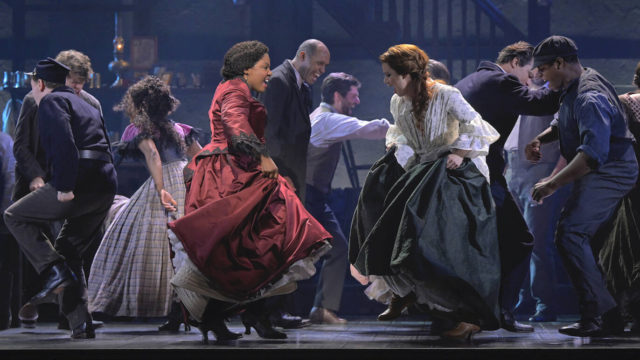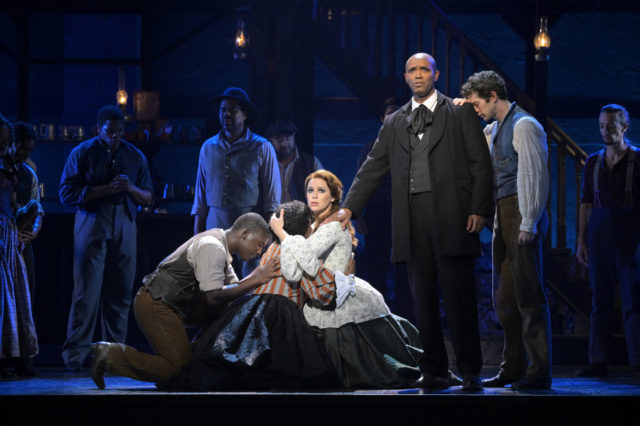
Races and dance styles mix it up in Paradise Square (photo by Kevin Berne)
PARADISE SQUARE
Ethel Barrymore Theatre
243 West 47th St. between Broadway & Eighth Ave.
Tuesday – Sunday through July 17, $39 – $250
www.paradisesquaremusical.com
Paradise Square gets off to a rousing start, with exciting choreography by Bill T. Jones, a fabulous set by Allen Moyer, a terrific cast led by Joaquina Kalukango, splendid period costumes by Toni-Leslie James, historical projections by Wendall K. Harrington and Shawn Boyle that establish the time and place, and thrilling music by Jason Howland and Larry Kirwan. But once Nathan Tysen and Masi Asare’s lyrics and the book, by Christina Anderson, Craig Lucas, and Kirwan, kick into full gear, the whole thing falls apart, leaving us to wonder what could have been. Not even two-time Tony-nominated director and National Medal of Arts recipient Moisés Kaufman can put it back together.
It’s 1863, the middle of the Civil War, and Nelly Freeman (Kalukango) is running the (fictional) Paradise Square pub in Five Points, at the corner of Baxter and Worth Sts., what she proudly calls “the first slum in America!” It’s a place where everyone, regardless of race, gender, or religion, can come for a “little bit of Eden.” As she sings, “All we have is what we are / Inside here we all feel free / We love who we want to love / With no apology / If you landed in this square / Then you dared to risk it all / At the bottom of the ladder / There’s nowhere left to fall.”
Nelly is married to Willie O’Brien (Matt Bogart), an Irishman who is captain of the Fighting 69th Infantry. Willie’s right-hand man is Lucky Mike Quinlan (Kevin Dennis); Nelly runs the saloon with Willie’s sister, Annie (Chilina Kennedy), who is married to the Reverend Samuel Jacob Lewis (Nathaniel Stampley). Willie and Mike are about to head back to the war. “We’ll be back before ya blink,” Mike promises. “On me word, Nelly. I’ll bring him to ya with all his workin’ parts still workin’.”
Annie’s nephew, Owen Duignan (A. J. Shively), arrives, looking to make a fresh start in a new land where the streets are supposedly paved with gold. Also showing up is Washington Henry (Sidney DuPont), an escaped slave seeking shelter until he is reunited with his wife, Angelina Baker (Gabrielle McClinton), who was separated from him in the woods. Meanwhile, a drunk piano player named Milton Moore (Jacob Fishel) comes in looking for a job; Nelly does not realize that he is actually Stephen Foster, who has already written some racist anthems (and who really did live — and die — in Five Points).

Broadway musical looks at slavery, immigration, war, and personal sacrifice (photo by Kevin Berne)
Keeping a close watch on everything that happens at the Paradise is uptown party boss Frederic Tiggens (John Dossett), who wants to close the establishment because it is the center of Black and Irish anti-South and anti-business voters, “a haven of social depravity and political ascension.” He confronts Nelly, calling her “a facilitator of prostitution, gambling, and drunken mayhem.” She humbly replies, “I am just one woman who runs a saloon.” He bites back, “Don’t play coy. A degenerate who somehow wields power in New York politics doesn’t get to be coy.” To which she responds, “But enough about you —.”
It all devolves quickly once Nelly decides to hold a dance-off in which the winner will get three hundred dollars, the exact amount needed to buy one’s way out of President Lincoln’s newly implemented draft for the Union army. “Three hundred dollars?! That’s more than a year’s wage!” an Italian longshoreman declares. “I won’t go,” a German longshoreman adds. “If you do not go, you will be considered a deserter and a criminal,” a provost marshal explains. “This is a rich man’s war that the poor and immigrant will have to fight,” an Irish longshoreman says. When two Black longshoremen are ready to sign up, the marshal tells them, “No coloreds. Only citizens and immigrants.”
The contest and its aftermath turns what was a compelling drama about immigrants, slavery, poverty, and war into a cliché-ridden narrative that will leave you exasperated, as Tiggens becomes more and more like cartoon villain Snidely Whiplash and the lines between good and evil might as well be drawn with a giant crayon, eliminating any nuance or subtlety. It really is a shame, since so many of the individual elements are outstanding; Anderson, Lucas, and Black 47 leader Kirwan don’t have enough faith that the audience will be able to weave its way through a more complex and realistic story, instead opting for the lowest common denominator. I nearly screamed at a plot development late in the show that still has me seeing red.
Two-time Tony nominee Kalukango (Slave Play, The Color Purple) is almost reason enough to see Paradise Square, but I had to wonder whether the showstopping standing ovation she received for her blazing solo “Let It Burn” was genuine or was at least partly egged on by an excerpt of a review on the theater’s facade that highlights the standing O from the Chicago production. The song includes such mundane lyrics as “I know why you have come here / What you want to erase / But I know that our spirit / Is bigger than this place.”
Paradise Square wants to make serious statements about issues that are still relevant a century and a half after the Civil War, but it can’t stop stepping on its own toes, unable to leap beyond the obvious.